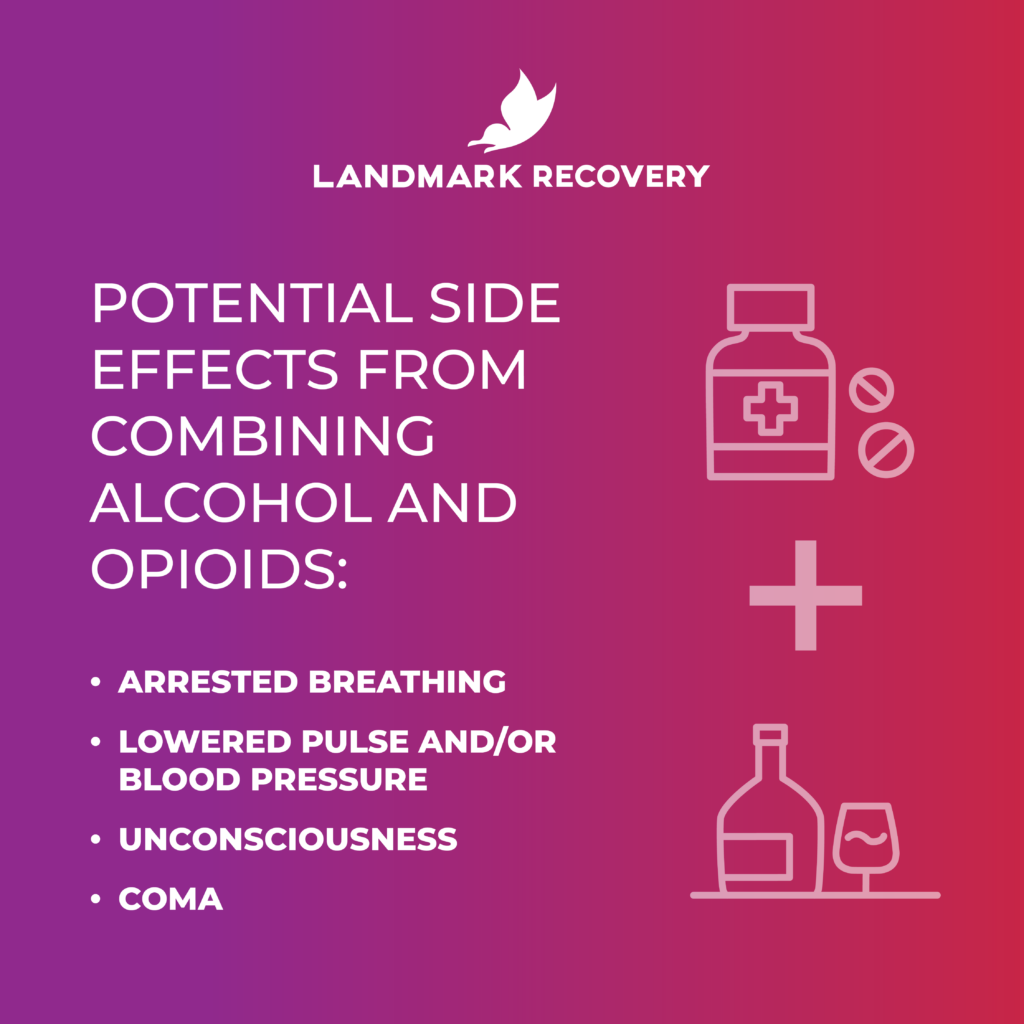What Happens If You Mix Oxycodone and Alcohol?
Mixing oxycodone and alcohol can have dangerous consequences, but that depends on several factors, including how much of the drug you’ve taken and how much you’ve had to drink. Almost 15% of people who died of an opioid-related cause in 2017 also consumed alcoholic beverages. In addition to heightened risk for negative behaviors leading to overdose, those who binge drink are four times as likely to abuse prescription opioids.
What Happens If I Take Painkillers with Alcohol?
The Centers for Disease Control (CDC) states that it’s simply not possible to safely consume alcohol while taking opioids. Opioids mixed with alcohol can severely depress respiratory function. Alcohol can also impact the effectiveness of Narcan, an overdose reversal drug.
A strong mix of opioids and alcohol can actually elevate the side effects from either substance. Opioid painkillers and alcohol together can dramatically increase drowsiness, which is a side effect of both drugs, according to the United Kingdom’s National Health Service (NHS).
Read more about oxycodone here.
The potential side effects of combining alcohol and opioids may include:
- Arrested breathing
- Lowered pulse and/or blood pressure
- Unconsciousness
- Coma
According to the University of Michigan, harm in combining multiple substances, such as alcohol and oxycodone can occur in three different ways:
- When people do not know that there are significant drug interactions and are caught by surprise when they inadvertently drink while using prescription medication
- When people knowingly combine alcohol with other drugs because they mistakenly believe it will be a “better” or “enriched” intoxication
- As a tool to facilitate a crime (sexual assault, robbery, etc.) by making a victim incapacitated
Can I Drink Wine and Take Oxycodone?
Mixing any alcohol, including wine, and opioids is not recommended, no matter how few drinks you have. If you plan on taking an opioid drug, refrain from consuming alcohol after taking the drug for 72 hours. This ensures the opioid substance is completely flushed out of the body before alcohol has a chance to interact. If you have issues with refraining from alcohol consumption for an extended period, please reach out to an addiction specialist or healthcare provider, such as Landmark Recovery.
Click here to read more about alcohol.
There appears to be some correlation between opioid and alcohol use disorders. A 1987 study, published in the academic journal Advances in Alcohol & Substance Abuse, stated that “opiate addicts in general and on methadone maintenance treatment appear to have unusually high rates of recognized alcoholism.” For those who receive prescription methadone as part of some kind of opioid use disorder treatment, alcohol metabolism can be affected by methadone use. For those who use illicit methadone, there is a risk of alcohol playing a role in overdosing. According to a 1984 study, more than 50% of overdoses in which opioid drugs (such as methadone) are implicated, concomitant abuse of alcohol has played a prominent role.
Learn More
To learn more about Landmark Recovery and the evidence-based addiction treatment services we provide, reach out to one of our admissions specialists at 888-448-0302 today. Our admissions specialists are happy to speak with those who need help. Don’t wait to get the treatment you need. We’re on a mission to save a million lives in the next century and we want you to be a part of it.

Choose Recovery Over Addiction
We're here 24/7 to help you get the care you need to live life on your terms, without drugs or alcohol. Talk to our recovery specialists today and learn about our integrated treatment programs.





